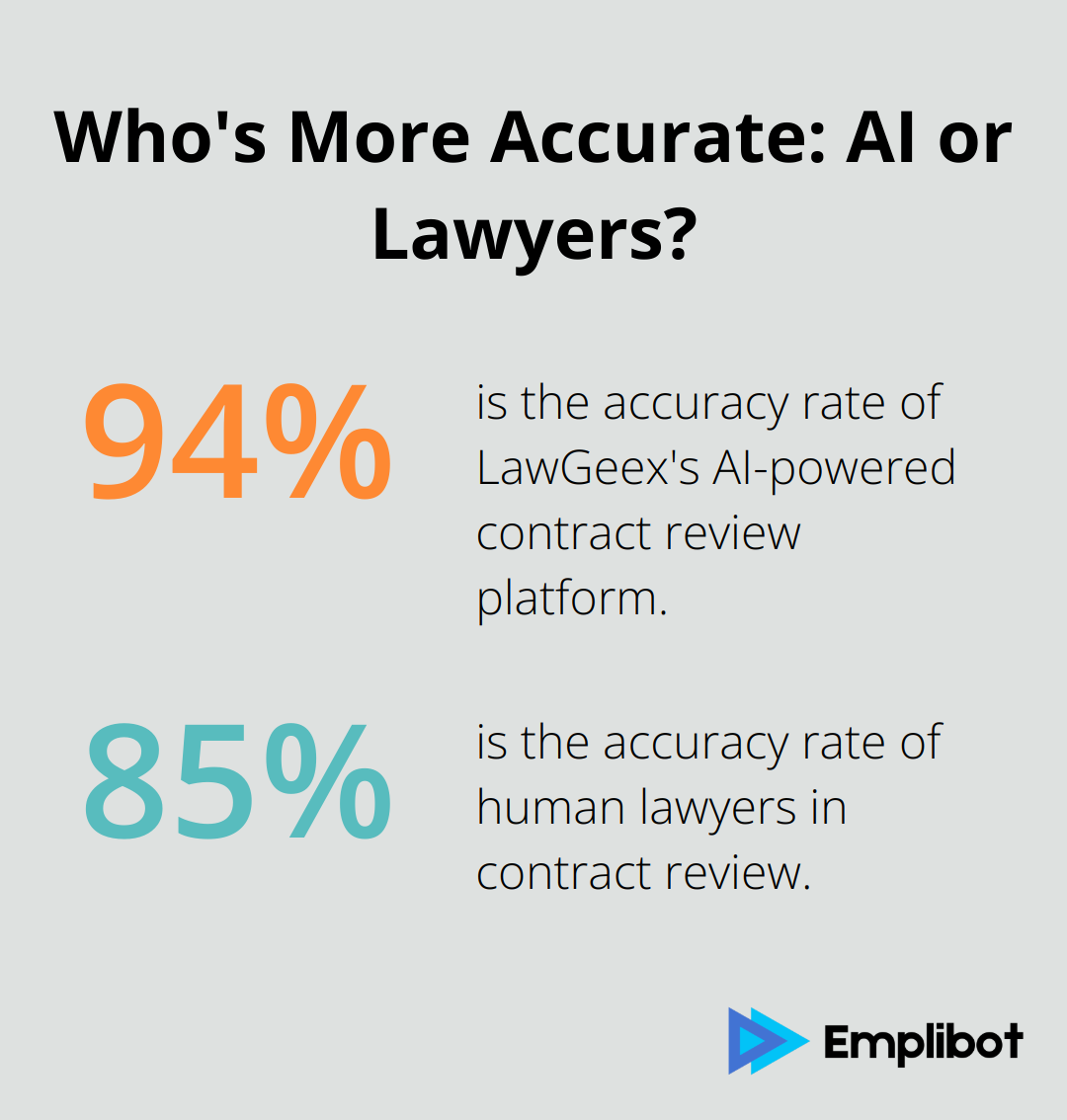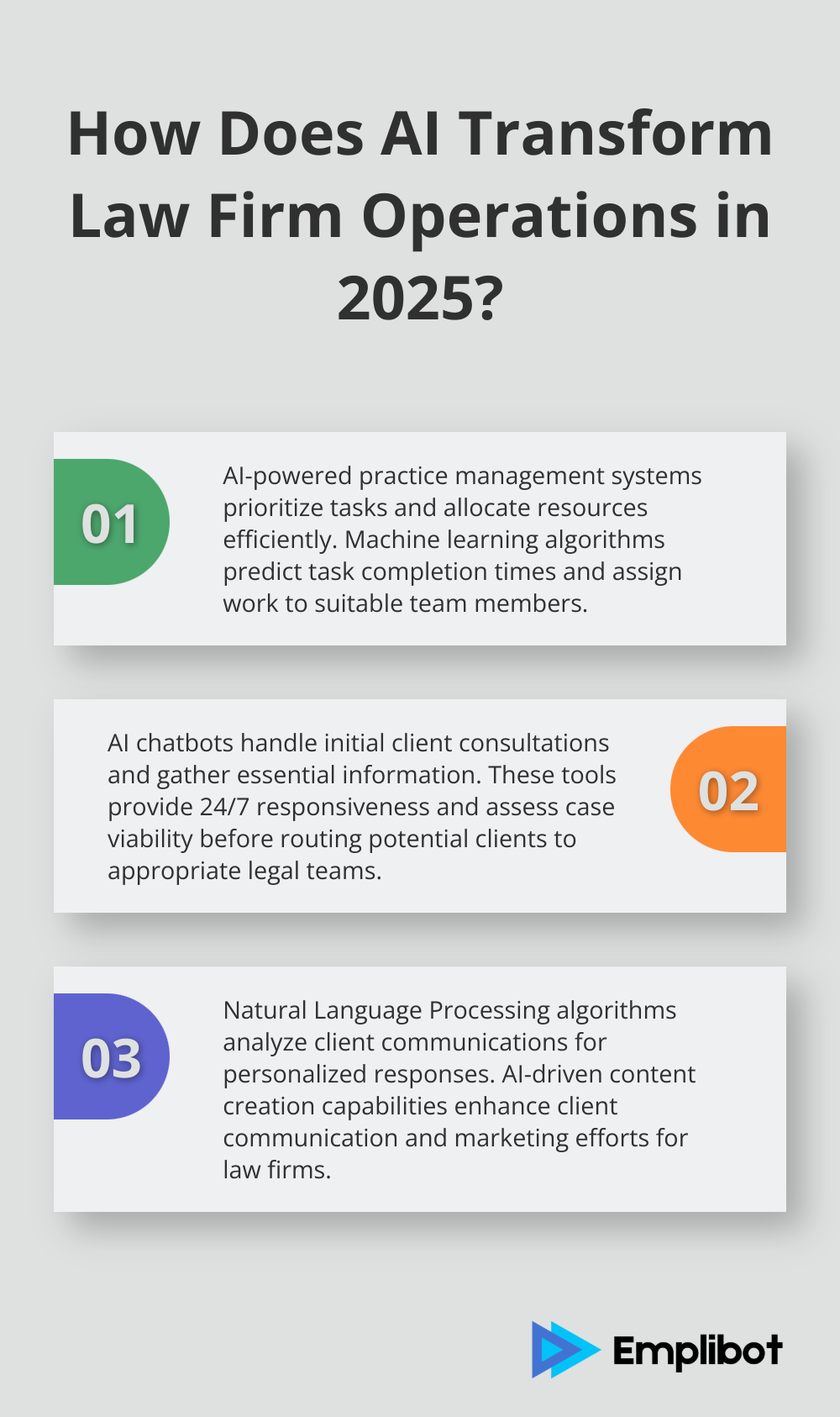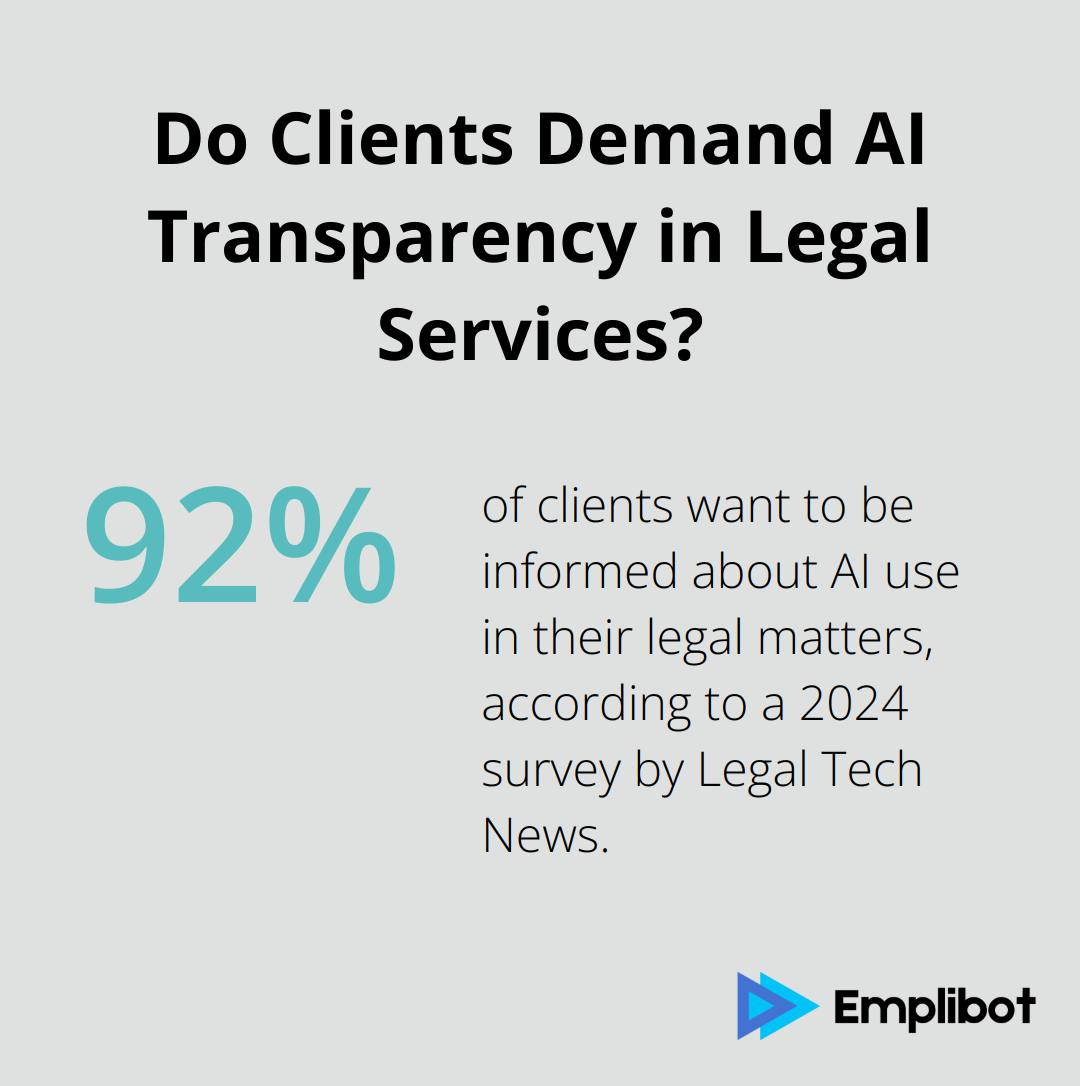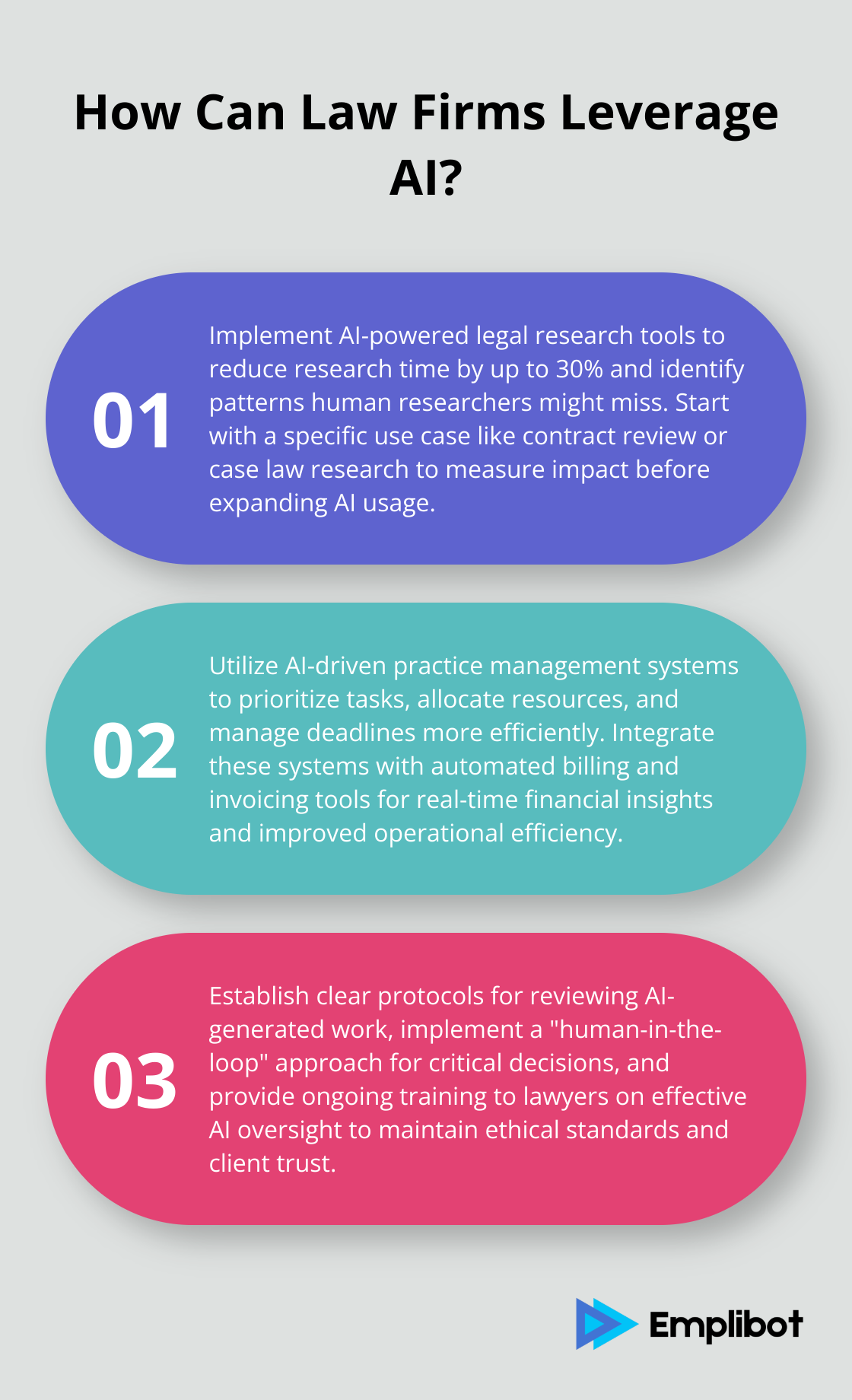The legal industry is on the brink of a technological revolution. Legal AI is transforming how law firms operate, from research to client communication.
At Emplibot, we’ve witnessed firsthand the rapid adoption of AI tools in legal practices. This guide explores the future of AI in law firms, highlighting key areas of impact and addressing ethical considerations.
Contents
ToggleHow AI Transforms Legal Research and Analysis
AI revolutionizes legal research and document analysis, making these tasks faster, more accurate, and cost-effective. The legal industry witnesses a significant shift in how law firms approach these core activities.
Supercharging Case Law Research
AI-powered legal research tools transform how lawyers find relevant cases and precedents. These systems analyze millions of documents in seconds, identifying patterns and connections that human researchers might miss. For example, ROSS Intelligence’s AI platform reduces research time by up to 30%, allowing lawyers to focus on higher-value tasks.
Streamlining Contract Review
Contract review and due diligence traditionally consume significant time. AI tools change this landscape dramatically. LawGeex, an AI-powered contract review platform, reviews contracts 26 times faster than human lawyers, with a 94% accuracy rate (compared to 85% for humans).
Predicting Case Outcomes
Predictive analytics presents another game-changing application of AI in law. These tools analyze historical case data to forecast potential outcomes, helping lawyers make more informed decisions. Law firms that embrace AI in 2025 will gain a strategic edge in eDiscovery, from early case assessment to data-driven negotiations.
Balancing AI and Human Expertise
While AI tools offer significant benefits, they complement rather than replace human expertise. Lawyers must still apply their judgment and experience to interpret AI-generated insights effectively. Law firms should consider starting with a specific use case (such as contract review or legal research) when adopting AI. This approach allows firms to measure the impact and gradually expand AI usage across other areas of practice.
The Future of Legal AI
As AI continues to evolve, we expect to see even more sophisticated applications in legal research and analysis. Law firms that embrace these technologies now will position themselves to lead in an increasingly competitive legal landscape. The next frontier for AI in law firms extends beyond research and analysis, reaching into practice management and client communication.

How AI Enhances Law Firm Operations
AI revolutionizes law firm operations, streamlines tasks, and improves client interactions. In 2025, AI-driven practice management and client communication tools become essential for competitive law firms.
Intelligent Task Management
AI-powered practice management systems transform how law firms handle their daily operations. These systems use machine learning algorithms to prioritize tasks, allocate resources, and manage deadlines more efficiently than ever before. AI is transforming the legal profession by automating routine tasks and boosting lawyer productivity through AI-powered tools that handle document review.

For example, AI-powered platforms analyze historical data to predict task completion times and automatically assign work to the most suitable team members. This intelligent allocation reduces bottlenecks and ensures optimal resource utilization.
AI-Powered Client Intake
Chatbots and virtual assistants revolutionize client intake processes. These AI-driven tools handle initial consultations, gather essential information, and even provide preliminary legal advice. AI makes it easier, ensuring accurate and up-to-date information about client networks. By scraping emails and calendar appointments of lawyers, AI chatbots can conduct initial client interviews, assess case viability, and route potential clients to the appropriate legal team. This not only saves time but also improves the client experience by providing instant, 24/7 responsiveness.
Personalized Client Communication
AI enables law firms to deliver more personalized and timely client communications. Natural Language Processing (NLP) algorithms analyze client emails and documents to generate tailored responses and updates.
While not specifically designed for law firms, AI-driven content creation and distribution capabilities (like those offered by Emplibot) can be invaluable for law firms looking to enhance their client communication and marketing efforts.
Automated Billing and Invoicing
AI-powered billing systems automate time-tracking, expense management, and invoice generation. These tools integrate with practice management software to provide accurate, real-time financial insights.
Predictive Analytics for Resource Allocation
AI algorithms analyze historical data to predict future workloads and resource needs. This allows law firms to optimize staffing levels, allocate resources more effectively, and improve overall operational efficiency.
As we move towards 2025, the integration of AI in law firm operations is no longer optional but necessary for firms aiming to stay competitive. However, with great power comes great responsibility. The next frontier in legal AI involves addressing the ethical considerations and challenges that come with this technological revolution.
Navigating the Ethical Maze of AI in Law
The integration of AI in law firms brings unprecedented efficiency, but it also introduces complex ethical challenges. Law firms must prioritize ethical considerations to maintain trust and integrity in their practices.
Safeguarding Client Confidentiality
Protecting attorney-client privilege is paramount when using AI tools. Law firms must implement robust data encryption and access controls to prevent unauthorized access to sensitive information. Clio’s 2025 guide to law firm data security covers best practices and tips for keeping law firm data more secure.

To address this, firms should:
- Conduct regular security audits of AI systems
- Train staff on data handling protocols
- Use AI tools that offer end-to-end encryption
Combating Algorithmic Bias
AI algorithms can perpetuate existing biases, leading to unfair outcomes. A new study reveals the need for benchmarking and public evaluations of AI tools in law, as legal models hallucinate 1 out of 6 or more benchmarking queries.
To mitigate bias, law firms should:
- Regularly audit AI outputs for bias
- Diversify the data sets used to train AI models
- Collaborate with AI developers to improve algorithm fairness
Maintaining Human Oversight
While AI enhances efficiency, human judgment remains essential. The New York State Bar Association’s 2024 guidelines on AI use in law firms emphasize the importance of lawyer supervision in all AI-assisted tasks.
Firms should:
- Establish clear protocols for reviewing AI-generated work
- Implement a “human-in-the-loop” approach for critical decisions
- Provide ongoing training to lawyers on effective AI oversight
Transparency with Clients
Clients have a right to know when AI is used in their cases. A 2024 survey by Legal Tech News found that 92% of clients want to be informed about AI use in their legal matters.
Law firms should:
- Develop clear policies on AI disclosure to clients
- Explain the benefits and limitations of AI tools used
- Offer clients the option to opt-out of AI-assisted services
As AI continues to reshape the legal landscape, addressing these ethical considerations is not just a moral imperative but a business necessity. Law firms that proactively tackle these challenges will build trust, mitigate risks, and position themselves as leaders in the evolving legal tech ecosystem.
Final Thoughts
The integration of AI in law firms marks a transformative era for the legal industry. Legal AI reshapes how lawyers work and interact with clients, extending far beyond mere efficiency gains. Law firms must identify specific areas where AI can provide immediate value, invest in training, and develop clear policies on AI use.

The future of AI in the legal industry promises more sophisticated applications capable of handling nuanced legal tasks. Human expertise will remain crucial, with successful firms striking the right balance between AI efficiency and professional judgment. Law firms that embrace AI now will position themselves to navigate the changing landscape and deliver superior client service.
At Emplibot, we help businesses harness the power of AI for content creation and distribution. While our focus is on automating content marketing, the principles of efficiency and innovation we embody apply to the legal sector. The legal AI revolution is here, and it’s reshaping the practice of law.






![Will AI Kill Blogging? [What You Need To Do Today]](https://wp.emplibot.com/wp-content/uploads/emplibot/ai-kills-blogging-1751008068-768x456.jpeg)



